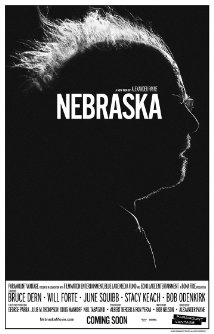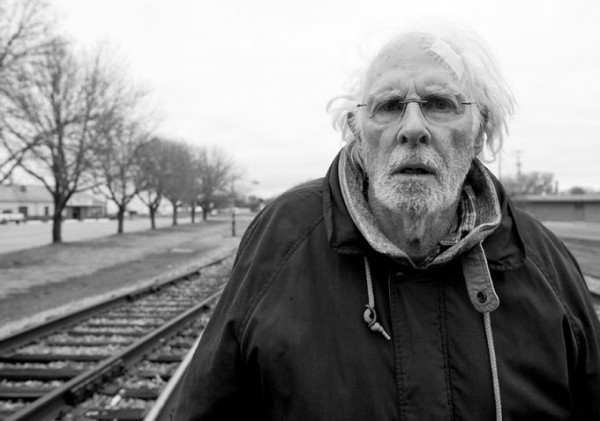Written by Bob Nelson
Directed by Alexander Payne
USA, 2013
Venerable Woody Grant (a grizzled Bruce Dern) has a singular purpose in mind, to get from his adopted Montana home to neighbouring Nebraska to collect a million-dollar cheque that a suspiciously speculative postal disclaimer has promised to honour. Elderly and suffering with decaying mental functions, Woody clearly can’t see through the marketing scam, and his wife Kate (June Squibb) and son David (Will Forte) grow increasingly exasperated at his dangerous footbound expeditions before arriving at a mutual solution: David will drive him to the HQ to collect his ‘winnings’, and maybe drop in on their hometown family on the way. An impromptu roadtrip is launched that might be the last chance the glum son can bond with his distant and alcoholic father, an opportunity to clear the air and learn of the family’s broad history before his Dad is consigned to a care facility and inevitable, final decline.
A melancholy air hangs over Nebraska from its opening mournful images of the expansive American hinterland, and it’s to screenwriter Bob Nelson’s credit that he manages to interject a baleful balanced humor into what would could have been a draining and depressing experience. Aside from the principals, some remarkably craggy and etched faces colonize the film throughout its hollow financial quest, as evidently Payne enjoyed casting from the local communities to provide a realistic texture to the tale. The local shop-owners, home-keepers, and barflies are all affected with a unique provincial twang and turn of phrase, as the rumors of Woody’s financial windfall prompt a hungry interest in his spending plans and potential generosity.
Payne is fond of the road-movie plot structure as a journey to examine his frail and flawed characters, whether it’s through the Californian vineyards of Sideways or the Colorado highways of About Schmidt, and his keen eye for environmental detail give his films a familiar dimension that usually makes a connection with its audience – who among us doesn’t have some hereditary regrets rattling around in reminiscence? Phedon Papamichael’s monochrome photography captures a desolately beautiful and wintery America that frosts the film with a somber edge, as bruised and resigned as its lightly remorseful small-town denizens. It seems to be an obvious attempt to invoke the studied melancholia of The Last Picture Show, Bogdanovich’s 1971 masterpiece, but with a sense of a life drawing to its inevitable decline with all its foibles and failures, rather than the suffocation of provincial restraints.
Dern seems certain to receive a Oscar nomination for his irascible performance, but some of the other characters, Jane in particular, seem a little too cruelly caricatured. Although she gets some gob-smacking lines, it does lend weight to the criticism Payne has attracted in the past that he can seem a little scornful and sneering behind the bittersweet coating. But Nebraska is gently amusing and touching with its light touch of Ozu-lite temprement; you’ll need a heart of stone not to be moved at some of the scenes of quiet reflection, of opportunities foiled and the unexpected paths we all travel. If you can choose your friends but not your family, as the popular adage goes, then Nebraska is deserving of joining your celluloid fraternity, a poignant psalm to the ineffable struggles of life.
— John McEntee

The London BFI Film Festival runs from October 9 to October 20, 2013. For a complete schedule of films, screening times, and ticket information, please visit their official site.



